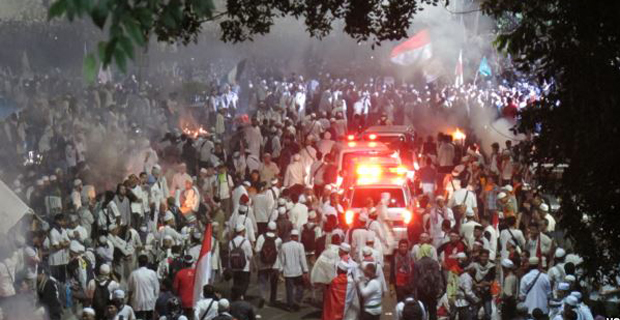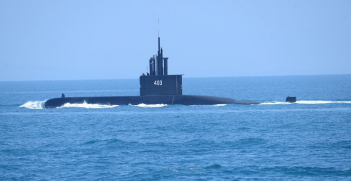Rescuing Governor Ahok

In November last year, the Indonesian government was surprised by the scale and fervour of the demonstrations in Jakarta demanding the jailing of Jakarta Governor Basuki Tjahaya Purnama, or Ahok, on spurious charges of blasphemy. The Indonesian government is now desperately trying to strike a balance between Islamic hardliners and Ahok’s right to participate in the upcoming elections.
Ahok’s alleged crime was that he deigned to suggest that the Koran did not forbid Muslims from choosing non-Muslim leaders or being ruled by non-Muslims, the equivalent of Deng Xiaoping’s dictum that it does not matter what colour the cat as long as it catches mice.
In reality, the allegations were not about blasphemy but about denying Ahok—a Christian Indonesian- Chinese—the opportunity to be elected governor in his own right at the 15 February elections. He was originally elected deputy governor to Joko Widodo (Jokowi) in 2012 and rose to the governorship only after Jokowi was elected president in 2014.
The government could not bow to the demands of the conservative Islamists, nor could it allow the police to dismiss the allegations as frivolous as they would bear the brunt the conservatives’ dissatisfaction and possible violence. Instead the government announced that charges would be laid and court proceedings accelerated to allow a verdict or at least a decision on his arrest to be reached before the elections.
The challenge was to find a panel of judges with the courage to find him not guilty and, if by some miracle the judges ruled accordingly, to diffuse the possible violent reaction. By early January the government had settled on an approach that involved indicting the protest leaders—particularly Habib Rizieq Shihab, the spiritual leader of the Islamic Defenders Front and prime mover of the demonstrations—for inciting hatred of minorities and denigrating the Pancasila (the five founding principles of the constitution). This would delay the passing of the verdict in Ahok’s case until May—a couple of months after the election—and galvanise public support for the tenets of the constitution and a nationalist interpretation of Islam.
The strategy evolved rather than being the result of a master plan. Community groups opposing the conservative Islamic agenda lodged complaints with police about inflammatory statements by Rizieq Shihab. Then on 10 January, after consulting with the judges in Ahok’s case, the police announced that his court proceedings might not be concluded before May.
Another protest ensued on 16 January repeating demands for Ahok’s arrest and some in the government expressed a desire to finalise proceedings before the elections. Meanwhile, the president has been calling for national unity and tolerance and has flagged the formation of a national reconciliation council to resolve social tensions outside the legal process, while simultaneously announcing his intention to establish an agency to reinvigorate the teaching of the Pancasila at all levels of the education system and in the bureaucracy.
The apparent assumptions behind this approach are that if Ahok is defeated in the elections the conservative Islamists will have achieved their aim and the judges can safely dismiss the case on technical grounds or find him not guilty. At worst the judges could find him guilty and impose a minor sentence. On the other hand, if he is re-elected the government will have the moral authority of the people having chosen Ahok despite the allegations of blasphemy against him. They will also have some leverage over the leaders of the conservatives to strike a compromise that both can live with.
It has been said that this problem would not have arisen had the intelligence services been doing their job and the political leadership had acted to forestall the crisis. The government has also been criticized for being too accommodating of the conservative leaders, adding to their political legitimacy.
Proponents for the rule of law regard the approach adopted as a travesty of justice and an affront to the separation of powers. In any case, as a means of conflict resolution it acknowledges the social and political realities and dynamics of Indonesian society. Historically, governments have sought to avoid confronting mobs and tried to diffuse issues by granting concessions, buying off or intimidating leaders of mass movements to limit the potential for violence and destruction.
Whatever Ahok’s fate, it will not be the end of the conservative challenge. Their objective since 1945 has been to create an Islamic state. Their numbers have always been insufficient to achieve this through the ballot box so the hardliners periodically resort to intimidation and violence to magnify their significance and garner support from the broader community by claiming to be the true defenders of the faith.
Jokowi has been able to rally the elite and the agencies of state and reinvigorate the promotion of the Pancasila and a moderate nationalist version of Islam that accommodates Indonesia’s great diversity. These efforts will be tested by the return of ISIS veterans, other global influences and alliances of convenience formed between more mainstream political parties and the Islamic conservatives in the run-up to the 2019 national parliamentary and presidential elections.
Bob Lowry is the president of the AIIA ACT Branch and a keen student of Indonesia’s politics and its military. He was posted to Indonesia while serving in the Australian Army and has previously worked with the International Crisis Group. Lowry is the author of The Armed Forces of Indonesia.
This article is published under a Creative Commons Licence and may be republished with attribution.





